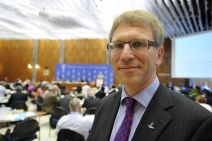WCC head preaches on peace to Korean congregations

The head of the World Council of Churches has delivered a Sunday sermon to congregations in Seoul, on God's will to "speak peace to his people," noting Koreans, like people in other places around the world, long for a final peace settlement in their land.
The Rev. Olav Fykse Tveit, General Secretary of the WCC, preached from Psalm 85:8-13, focusing on people's longing for peace in all areas of life.
"The Korean people have been longing for a final peace to be settled, a peace that can bring life together, make life together in peace on this peninsula possible again," he said. "So have the peoples in Palestine, and Israel. So have the people in Syria."
North and South Korea are currently split by the world's most fortified border, and are still technically at war since no peace treaty was signed at the end of armed conflict 60 years ago.
Rev. Tveit told the South Korean congregations that after being told about peace, people needed to believe it was true.
"Peace is something radical, something that has to be told – and has to be believed so that it may become possible," he said.
He recounted his mother was told at the end of the occupation of Norway that World War II was over, "that the peace came."
While there had been rumors, his mother said she did not believe it until she saw people burning the blinds and curtains they were forced to use to avoid lights on the streets to prevent bombers from identifying streets in the city.
"What made her hear and feel the peace she was longing for was that people dared to believe it and they, themselves took action accordingly," he said.
"There is a deep connection between the promise that God will speak peace to his people and that the people dare to act accordingly, to live in steadfast love, in faithfulness, in righteousness, in justice," he added.
The Rev. Tveit notes that Psalm 85 begins with a reflection about sin, but with hope that God forgives and restores though the forgiveness is undeserved.
"This is often experienced through acts of undeserved love from others; signs that help us to believe that God is forgiving us, creating new opportunities through a real embrace," he said.
Peace and the Ecumenical movement
He also previewed the upcoming WCC's 10th Assembly in Busan, Korea in late October and early November noting the importance of hearing about peace and the role of the ecumenical movement in making that happen.
"The words we hear today in this place are the words of God the Lord," he said. "The words we will be hearing in the Assembly of the World Council of Churches in Busan, in some months, are the words of God the Lord, speaking peace to his people."
He added that: "Sometimes we need to hear the words of peace in the words of others who are different from us. Therefore we need the fellowship of the ecumenical movement; to learn about our own shortcomings and the gifts we receive in order to become peacemakers."
The Rev. Tveit drew attention to how the "life of God" manifests itself in diverse ways through people and through families of churches.
"This diversity and color of life is the peace we receive from the God of life," he said. "The peace of God is found in the vulnerability of life, and in strong expressions of life, both in the quiet and in the flourishing of life, in life as it is. This is the peace that transcends all understanding. This is the peace that shall transcend and remove all borders once drawn by hatred and war and violence."
He concluded by asking if people are listening and if they will make peace.
"God will speak peace to his people. Do we listen? God will speak peace to his people. Do we make peace? God will speak peace to his people. Amen."